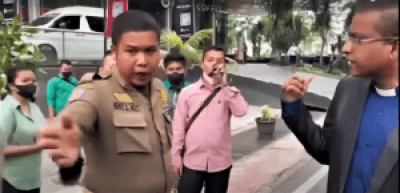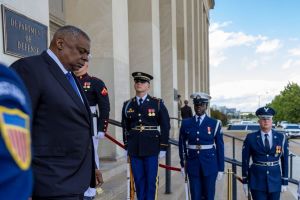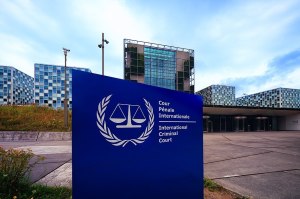Gov't officials prohibit Christian worship service outside city hall in Indonesia

SURABAYA, Indonesia — A church in Indonesia on Jan. 8 was prohibited from holding a Sunday service in front of a city hall building, where it had gone after losing its prior worship venue in a mall, sources said.
Following opposition to the church’s services in a mall in Medan, North Sumatra Province, the head of the Medan Public Order Enforcer (Satpol Pamong Praja, or SPP), Rakhmat Harahap, and his unit banned an Elim Church Indonesia Christian (GEKI) congregation from holding worship near the Medan City Hall.
Harahap said the church had no permission to worship in front of the Medan City Hall, just as officials earlier had said they had no permission to worship at the Suzuya Mall in the Marella area of Medan.
A video appearing on social media shows a row of Medan Municipal SPP members with congregation members in the middle of traffic on Kapten Maulana Street, in Medan Petisah Sub-District’s Petisah Tengah, Medan. The site is about 150 meters from Medan City Hall.
The video shows a church leader asking Harahap to reveal who ordered the ban on the congregation from holding the Sunday service, to which Harahap replies, “I don’t have to let you know.”
“We need to know,” the church leader replies, then raising his hand saying, “This man has an order from his commandant.”
A woman is heard saying, “There will be a wedding — we have to bring the needed things,” before unresponsive officers.
A video narrator states that Public Order Enforcer staff prohibited church members from parking vehicles at the site and kept them from opening car doors.
In the video, Harahap says the site near the city hall was not allocated for religious service and so was opposed by area people. Harahap on Jan. 14 told online newpaper TribunMedan that the GEKI congregation lacked permission to hold a religious service at the site. He added that there is no ban on Christian worship, but that all parties must comply with legislation.
The Rev. Henrek Lokra, executive secretary of justice and peace of the Communion of Christian Churches (PGI), told Morning Star News that the GEKI congregation previously rented a room at Suzuya Mall for worship, which ended abruptly.
“They had rented a room in Suzuya Mall but were opposed by a group of people,” Lokra said. “Later on, the local administration opposed it as well, since the mall, they say, is not allocated as a place of worship.”
GEKI congregations have held worship services near the Medan City Hall three times since Jan. 1, said Suryani Paskah Naiborhu, deputy to the general treasurer of the Indonesian Christian Youth Movement (GAMKI) Central Board, to medanbisnisdaily.com on Jan. 10.
Suryani said banning worship is against all higher legislation, including the constitution, as quoted on Jan. 4 by RMOL Sumut. The Medan City administration, she said, has a role in solving the problem facing the GEKI congregation.
The general secretary of the PGI, North Sumatra Region, the Rev. Eben Siagian, told HarianSIB.com on Jan. 10 that the prohibition of worship was unreasonable. The owner of the Suzuya building had the right to rent out one of the rooms at the mall for worship as long as there were no harmful activities, he said.
“How long will it be before incidents like this end in our country?” Siagian said. “What are their objections and loss if there is a place of Christian worship in Suzuya?”
Police must investigate why local people are objecting, he reportedly said on Jan. 8, because the government must facilitate worship in accordance with the constitutional guarantees of freedom of religion. Appealing to all parties to act fairly, he said no one should object to worship venues.
His colleague, Lokra of the PGI, concurred, saying the government should not keep threatening Christians.
“The government is given the responsibility by the constitution to solve the problems of society,” not create problems, he said.
Precedents
Holding religious services on the sidewalks or in front of the government buildings to draw the attention of high-ranking officials in the Muslim-majority country is not a new practice.
In the 1990s, at the peak of Indonesia’s New Order regime, congregations of the Christian Church of Protestant Indonesia (GKPI) and Catholics in the same city, Medan, undertook the practice following the banning of their church services.
In response to the pretext that congregations had no legal permission — applications for which are largely ignored or denied — they began holding services on the sidewalk. They ceased after two leading Christian organizations joined the action, finally prompting the local administration to issue permits.
The congregations of the Bogor Indonesian Christian Church (GKI Yasmin Bogor) and Filadelfia Huria Kristen Batak Protestant, Bekasi undertook the same practice. Both congregations were holding worship celebrations in front of the state palace in Central Jakarta since February 2012, every two weeks, following the banning of their churches by religious radicals. Lokra of the PGI said the practice ended during the COVID-19 pandemic.
On Jan. 17, Indonesian President Joko Widodo told regional heads that all officials should be careful about banning houses of worship based on local administration regulations or instructions.
“Don’t let the constitution lose against an agreement [by local officials],” Widodo said at the Regional Head National Coordination Meeting in Sentul, West Java. “The constitution must not be forfeited because of agreements. These examples make me think sometimes — is it really that difficult for someone to practice their religion? It saddens me to hear such a thing.”
Everyone in Indonesia, Widodo said, has the same right to worship.
“Our constitution guarantees freedom of religion and worship,” he said. “Even if it’s only one, two, three cities or regencies, be watchful for such cases.”
A Medan administration official, H. Syofian, had no comment to journalists about the incident.
The mayor of Medan Municipality, Bobby Afif Nasution, is the son-in-law of Widodo. Married to Kahiyang Ayu, the first daughter of Widodo, Bobby has been the mayor of the city since Feb. 26, 2021.
Indonesia ranked 33rd on Christian support organization Open Doors’ 2023 World Watch List of the 50 countries where it is most difficult to be a Christian. Indonesian society has adopted a more conservative Islamic character, and churches involved in evangelistic outreach are at risk of being targeted by Islamic extremist groups, according to Open Doors’ WWL report.
“If a church is seen to be preaching and spreading the gospel, they soon run into opposition from Islamic extremist groups, especially in rural areas,” the report noted. “In some regions of Indonesia, non-traditional churches struggle to get permission for church buildings, with the authorities often ignoring their paperwork.”
Morning Star News is the only independent news service focusing exclusively on the persecution of Christians. The nonprofit's mission is to provide complete, reliable, even-handed news in order to empower those in the free world to help persecuted Christians, and to encourage persecuted Christians by informing them that they are not alone in their suffering.





























